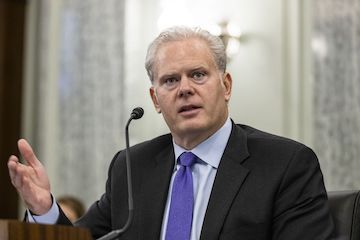FedEx Corp. said Richard W. Smith, son of founder and Chief Executive Officer Fred Smith, will take over leadership of the FedEx Express division later this year, boosting speculation the younger Smith may be in line eventually for the company’s top job.
Richard W. Smith will succeed Donald F. Colleran, 66, who is retiring after an almost 40-year career at FedEx, the Memphis-based company said Thursday in a statement. Smith, 44, currently regional president of the Americas and executive vice president of global support, will become president and CEO-elect of FedEx Express on April 1 before assuming full duties on Sept. 1.

Smith’s elevation may come as a surprise to some FedEx watchers and suggests a top role for him when Fred Smith eventually retires. The 77-year-old has been saying for at least two years that he’s nearing the end of his four-decade tenure as CEO. The elder Smith, who is also chairman, has recommended Chief Operating Officer Raj Subramaniam as his successor. In FedEx’s last full fiscal year, FedEx Express made up a bit more than 50% of sales.
“With the outstanding executive management team we have in place to execute our strategy, including leaders like Richard, I am confident in the future of FedEx,” Subramaniam said in the statement.
FedEx was little changed after the close of regular trading in New York.
Smith has been overhauling his company and top management over the last couple of years to stem declining profit margins. E-commerce packages, which are more costly to handle than commercial deliveries, have become the majority of deliveries and hold the most promise for growth. Smith’s changes, such as moving to seven-day service and focusing on small businesses, were designed to shift FedEx from being geared toward commercial deliveries.
“The elevation of Smith to be president of FedEx Express makes a succession plan a little more interesting,” said Lee Klaskow, a Bloomberg Intelligence analyst. “We still see Raj as the clear No. 2 at least in the near term.”
The changes at FedEx have also churned at management as well. Henry Maier stepped down as chief of FedEx’s Ground unit in July and was replaced by John Smith, who isn’t related to the founder and ran the company’s freight unit. Lance Moll took over at Freight.
Subramaniam has had a quick rise through FedEx ranks. He went from being named chief of marketing and communications in 2017 to becoming the head of FedEx’s Express unit two years later. Less than two months on the job at Express, the company then appointed Subramaniam as chief operating officer after the abrupt departure of then-COO David Bronczek. A month later in March of 2019, Colleran was named as chief of FedEx Express.
Succession Plan
In a December 2019 interview, Smith said he has a formal succession plan that involves having two position-ready successors for 40 of the top executive jobs, including CEO. He has recommended to the FedEx board that Subramaniam become CEO if Smith steps down from the position. That succession plan hasn’t changed, according to a FedEx spokesperson.
Richard Smith joined the company in 2005 and worked his way up to the No. 2 executive at FedEx Express. He played active rolls in transporting personal protective equipment to the U.S. when the pandemic first hit two years ago as well as the vaccine rollout at the end of 2020. Smith, who was born in Memphis where FedEx is headquartered, earned an undergraduate degree from George Washington University and a law degree from the University of Mississippi, according to FedEx’s website.
The move increases the chances that Richard Smith could challenge Subramaniam down the road as Fred Smith’s successor, Klaskow said. Fred Smith is the largest shareholder of FedEx with a stake of about 7.3%, according to data compiled by Bloomberg. Still, the younger Smith would have to elevate his profile and build investor confidence to have a shot at the top job, Klaskow said.
“Maybe by running one of it’s larger businesses he might have that opportunity,” Klaskow said. “At the end of the day, investors just don’t know him that well.”









